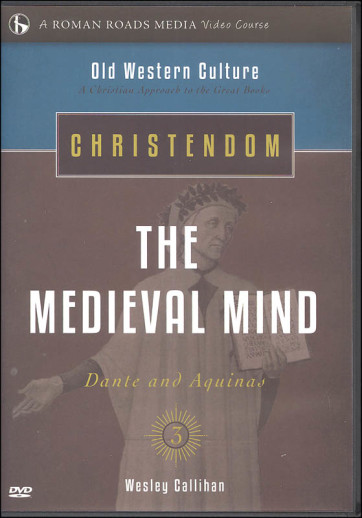We use cookies to make your experience better. To comply with the new e-Privacy directive, we need to ask for your consent to set the cookies. Learn more.
Christendom: Medieval Mind DVD Set (Old Western Culture)
Christendom: The Medieval Mind begins by guiding students through the basics of Thomas Aquinas' Compendium, introducing students to the medieval mindset which greatly influenced later theologians and philosophers. With this foundation, students embark on a journey through Dante's conception of Hell, Purgatory, and Paradise in The Divine Comedy, exploring medieval concepts of guilt, atonement, beauty, and the cosmos. Meet many classical characters from the Greeks to Dante's present day as Dante uses his allegory to explore human nature, as well as the politics of his day.
Lecture list:
- Introduction to The Medieval Mind
- Aquinas' Compendium I
- Aquinas' Compendium II
- Aquinas' Compendium III
- Introduction to Dante
- The Inferno I
- The Inferno II
- Purgatorio I
- Purgatorio II
- Paradiso I
- Paradiso II
- Conclusion
The books and ideas that shaped Western Civilization shape these 4-year humanities-integrated courses. Examine literature in the context of its history, theology, philosophy, poetry, and art. Yearly courses are further divided into 4 self-contained units. Expect 1-3 hours of work daily, with full video instruction, lots of classic reading, studying period artwork, meaningful response assignments, discussion questions and quarterly exams. Works studied will vary from primary historical sources to significant literature, both which will broaden and enrich the student's understanding of that time.
The Greeks presents this culture's contribution to literature, philosophy, and government. In the Epics Reader (available Summer 2021), students read the Iliad and the Odyssey. The course will include Greek poetry and history, works such as Euripides, Sophocles, and the culture-influencing works of Plato and Aristotle.The first quarter of Romans covers the Aeneid. Then, experience Rome's growth from republic empire with works of Livy, Julius Caesar, Cicero, as well as Augustine's Confessions and City of God. This year documents the growth of Christianity, with its rise, doctrinal challenges, and ends with the Nicean Council.
Alongside the most influential writings of early Medieval through the Reformation, Christendom covers Christianity's influence on faith, thought, and culture: from Justinian to Calvin, Luther, and Erasmus. Read such works as Beowulf, Arthurian legends, works of Thomas Aquinas, The Divine Comedy, History of the Kings of Britain, Canterbury Tales, and the Faerie Queene.
Look at the rise of British culture and political influence with Early Moderns. Begin with Shakespeare's King Lear, Richard III, The Merchant of Venice and six sonnets. Other Western influential works include Paradise Lost and a major poetry emphasis (such as Wordsworth, Byron, Keats). The year ends with a move to Englightenment (scientists and philosophers such as Galileo, Descartes, Newton, Kant) and the Novels (of Dickens, Dostoevsky, and Jane Austen) and writings of Chekhov, Tolkien, and C.S. Lewis.
The DVD lectures utilize instruction from a handful of seasoned teachers with expertise in the time period or genre. The number of lectures varies somewhat per level. Each DVD serves as the course hub including lectures, a "Guide to the Art" (a 24-pg booklet), and PDF versions of student workbooks, exams, and reading material (although not identical to the recommended list). For those who prefer, printed Student Workbooks provide questions (with answer key) for every reading assignment and lecture, additional discussion questions and other resources for deeper study. You may already own the recommended classic literature (exact editions not required). However, hefty, printed Readers are also available (several hundred pages per quarter) individually or as a full year set. Ordering options provide flexibility: buy each item individually, as component sets, or as complete printed year packages. Additional resources are available free on https://romanroadsmedia.com/materials/.
~ RuthYear 3: Christendom includes Medievals, Defending the Faith, the Medieval Mind and the Reformation.
Wish to streamline this course but still maintain enough rigor for a 1-credit course? If you’re not needing an honors-equivalent rigor, the publisher recommends the following as most crucial for study: The Rule of St. Benedict; Book of Pastoral Rule by Gregory the Great, Beowulf, Proslogium by Anselm of Canterbury; History of the Kings of Britain by Geoffrey of Monmouth; The Divine Comedy (ideally the full work. Read Inferno if you must choose one); The Knights Tale by Geoffrey Chaucer; Clericis Laicos and Unam Sanctam by Boniface the VIII; Julius Exclusus by Erasmus of Rotterdam; The Freedom of the Christian by Martin Luther; and selections of Foxe’s Book of Martyrs.
| Product Format: | Other |
|---|---|
| Brand: | Roman Roads Media |
| Grades: | 9-12 |
| EAN/UPC: | 646648846794 |
| Length in Inches: | 7.5 |
| Width in Inches: | 5.375 |
| Height in Inches: | 0.625 |
| Weight in Pounds: | 0.35 |

